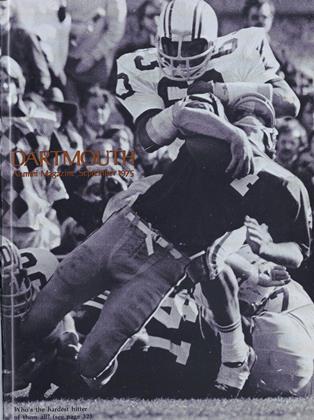THE problems facing the new alumnus are well- known, but what are the special problems that face foreign student graduates - known only to immigration officials and science fiction writers as "aliens"?
The most pressing problem for the alien graduate is to become unalienated. If the foreign student wants to remain in America, he can start proceedings to become an American. If he wishes to remain in America under his present citizenship, he should have spent the spring term of his senior year looking for an American fiancee. The usual criteria involve finding a woman with money, good looks, and old parents. The importance of the criteria is indicated by the order in which they appear.
In my instance, a fruitless spring search of various women's dormitories, junior colleges, and even nurses' residences indicated that the term "alien" may have been a reference to my unfamiliarity and unacceptability in meaningful social relationships - and not just bureaucratic jargon.
Since that was the case, my only recourse was unalienation by crossing the Canadian border in a Toyota packed to the roof with four years' accumulation of books and miscellaneous junk. Crossing the border was less difficult and much less frustrating than seeking out matrimonial candidates in New England.
There was a curious exchange at the border, though - as curious as any exchanged while looking for a desirable woman with rich, old parents. The standard query of, "What is the value of the goods you purchased while in the U.S.?" left me limp with laughter. I envisioned tallying Dartmouth Book Store receipts until my fifth reunion. The immigration officer peered into the backseat at the lamps, shirts, records, books, rugs, and kitchen utensils. She just shook her head and with one flick of her yellow immigration pad I was no longer alienated - no longer a prisoner of quarterly residence cards and yearly F-1 visa forms, or a fugitive from ominous immigration spot-checks.
In some ways I was still alienated. Montreal presented a slight language problem that my Dartmouth French could not seem to handle. I had to readjust my listening habits to accommodate a different accent than the ones I had grown to love and know - Boston twang, Midwestern nasality, Southern drawlality, and Californian incoherence. One aspect of my language never left me, though. The "oot" and "aboot" that I carried with me through calumny and catcalls at Dartmouth found a very congenial home in Montreal.
One of the minor problems that I encountered in my homeland was the difference between American and Canadian money Since I see very little of either type of currency, my confusion should be limited. The only difficulty may arise when Mother Dartmouth starts to collect my loan payments. With any luck at all, the daily fluctuations in exchange rates should produce enough confusion to allow me time to find the money to pay the loans no matter what the status of the currencies.
The new Canadian alumnus must also face the disheartening task of explaining what and where Dartmouth College is. The easy illusion of Ivy League importance is whisked away by the first inquirer who remarks that he thought Dartmouth was a community college across the bay from Halifax.
Moving back to Canada has negated one very important and time-consuming activity at Dartmouth - meeting influential alumni. Some very cynical and pessimistic individuals would insist that influence accumulation is the most important aspect of the "Dartmouth experience," and that the only reason a Dartmouth diploma is worth anything is because it smoothes the way to getting a job in an alum's company. I would have to disagree with those negative positions. I never met a corporate head at a tailgate party in the fall whose conversation I didn't find a rewarding and valuable experience in itself. I never met one of those fine gentlemen who failed to buy one of the football programs I was hawking, either.
Of course, there are very active alumni clubs in Canada, but I know few of the members yet. In fact, many members of the Canadian Dartmouth community are still down in the States. They were either successful in their springtime spouse search, or they are still adding up "the amount of goods purchased while in the U.S."
Alienated from Saskatoon, Saskatchewan, David Dunbar was amusic major, rock critic, and hockey defenseman at Dartmouth.
 View Full Issue
View Full Issue
More From This Issue
-
 Feature
FeatureThe First 25 Years of the Dartmouth Bequest and Estate planning Program
September 1975 By Robert L. Kaiser '39 and Frank A. Logan '52 -
 Feature
FeatureThe Computer Goes Fishing
September 1975 By DARREL MANSELL -
 Feature
FeatureFive Plays for All Seasons
September 1975 By DREW TALLMAN and JACK DeGANGE -
 Feature
FeatureAlumni Fund Chairman's Report
September 1975 -
 Feature
FeatureAn Irresistible Force?
September 1975 -
 Feature
FeatureReport of the Office of Development
September 1975







